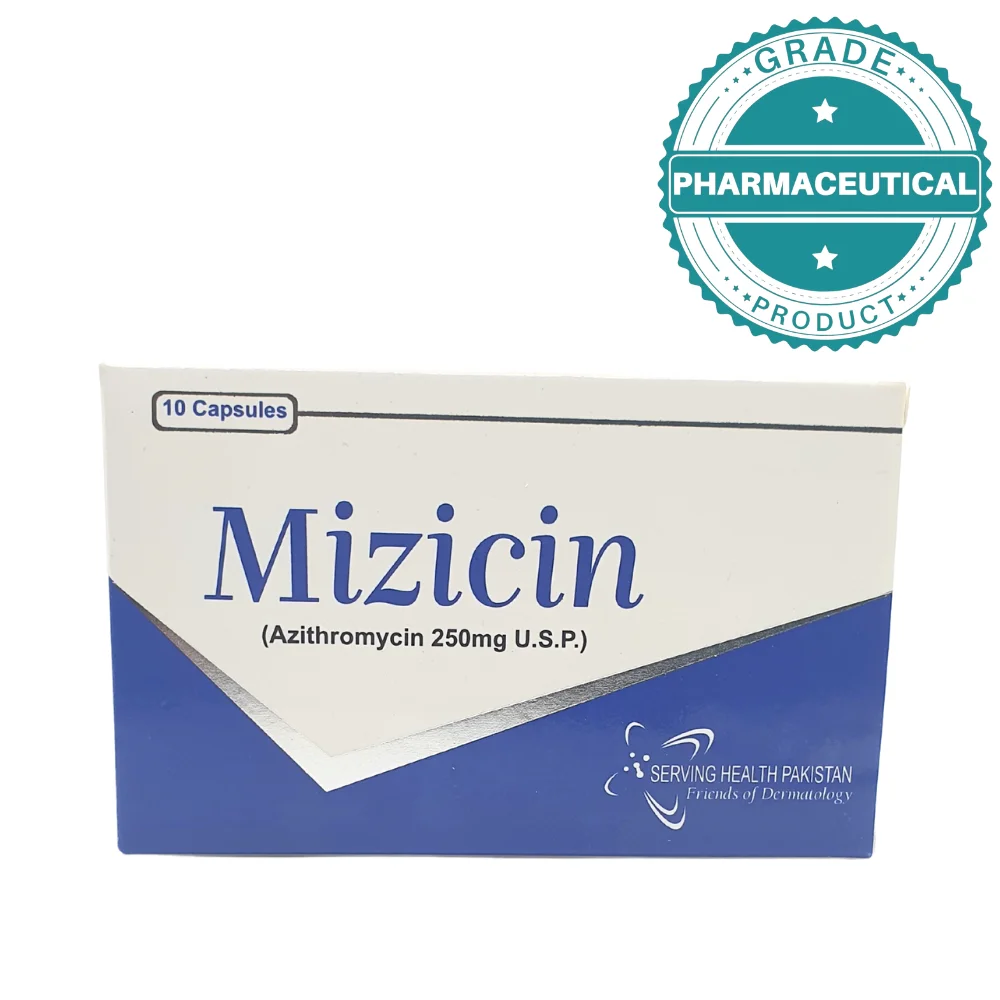MIZICIN (Azithromycin 250mg): A Comprehensive Guide to Usage, Effects, and More
Introduction:
Explore the details of MIZICIN CAPSULES containing Azithromycin 250mg, a potent azalide subclass of macrolide antibiotics for oral administration. This article provides an in-depth overview, covering its description, clinical pharmacology, mechanism of action, microbiology, indications, dosage, adverse effects, warnings, and more.
Description:
MIZICIN, containing Azithromycin as the active ingredient, belongs to the azalide subclass of macrolide antibiotics. The capsule is designed to facilitate therapeutic use through oral administration, offering a convenient form.
Clinical Pharmacology:
Upon oral administration, MIZICIN (Azithromycin) rapidly absorbs and widely distributes throughout the body. Bioavailability is approximately 37%, with a peak plasma level reached in 2-3 hours. Notably, Azithromycin exhibits higher levels in tissues than in plasma, indicating rapid distribution and high tissue binding.
Mechanism of Action:
Azithromycin acts by binding to the 50s ribosomal subunit of susceptible microorganisms, interfering with microbial protein synthesis. Importantly, it does not affect nucleic acid synthesis.
Microbiology:
MIZICIN has demonstrated activity against various microorganisms, including aerobic gram-positive and gram-negative bacteria. Notable examples include Staphylococcus aureus, Haemophilus influenza, Chlamydia pneumoniae, and more.
Indications:
MIZICIN is indicated for various respiratory tract infections, skin and skin structure infections, sexually transmitted diseases, and more. Specific indications include lower respiratory tract infections, upper respiratory tract infections, streptococcal pharyngitis, and sexually transmitted diseases.
Dosage and Administration:
Dosage recommendations vary based on age and condition. Adults can take a total dose of 1.5g, either as 500mg daily for 3 days or as 500mg on day 1 followed by 250mg on days 2-5. Children over 6 months have recommended doses based on body weight.
Adverse Effects:
MIZICIN CAPSULES has a low incidence of side effects, with most being gastrointestinal in origin. Nausea, vomiting, abdominal discomfort, and reversible elevation in liver transaminases are observed. Allergic reactions, ranging from rash to angioedema and anaphylaxis, have occurred.
Warnings and Precautions:
It is recommended to observe for signs of superinfection. MIZICIN CAPSULES crosses the placenta but has shown no harm to the fetus. Patients with renal or hepatic impairment should exercise caution
Contraindication:
Patients with known hypersensitivity to azithromycin or any other macrolide antibiotic should not take MIZICIN.
Drug Interaction:
MIZICIN has minimal evidence of significant pharmacokinetic interactions. Exercise caution with certain medications, such as ergot derivatives and terfenadine.
Over-dosage:
There is no specific data on overdosage. Indicate gastric lavage and supportive measures.
Instructions:
Store MIZICIN in a cool and dry place, keeping it out of the reach of children.
Presentation:
The blister packs of MIZICIN capsules present 1×10 capsules, each containing Azithromycin 250mg as dihydrate.
Conclusion:
This comprehensive guide provides a thorough understanding of MIZICIN, offering insights into its pharmacological profile, recommended usage, potential side effects, and more. Always consult with a healthcare professional for personalized advice and treatment.





Shazeen –
They follows all the necessary regulations. It gives me peace of mind knowing that I’m getting quality products
Gazala –
derma.pk have online pharmacist available to confirm your prescription
Rafeeq –
Love to recieve the products